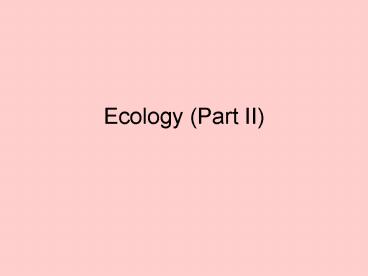Ecology Part II - PowerPoint PPT Presentation
1 / 31
Title:
Ecology Part II
Description:
The number of organisms of one species that an environment can support indefinitely. ... is exponential and is going almost straight up at the present time. ... – PowerPoint PPT presentation
Number of Views:35
Avg rating:3.0/5.0
Title: Ecology Part II
1
Ecology (Part II)
2
Population Growth
- How Fast Do Populations Grow?
3
Types of Growth
- linear growth straight line growth, for every
unit increase on the x axis, there is an equal
increase in the value on the y axis. In nature,
populations do not grow in this manner.
4
Types of Growth
- exponential growth occurs in populations where
the population grows at an increasing rate. - Populations in nature may grow exponentially
when organisms occupy a new environment and
limiting factors have almost no affect on them.
5
Start out with slow growth.
6
(No Transcript)
7
(No Transcript)
8
(No Transcript)
9
(No Transcript)
10
(No Transcript)
11
(No Transcript)
12
(No Transcript)
13
(No Transcript)
14
(No Transcript)
15
(No Transcript)
16
Get the picture?!
End with exponential numbers.
17
You end up with a J-shaped growth curve, or an
exponential growth curve.
18
However
- no population can continue to grow exponentially
indefinitely.
19
There will always be limiting factors.
- Availability of food
20
There will always be limiting factors.
- Availability of food
- Disease
Courtesy of the disease called AIDS.
21
There will always be limiting factors.
- Availability of food
- Disease
- Predators
SorryI had to
22
There will always be limiting factors.
- Availability of food
- Disease
- Predators
- Lack of space
- Etc
23
Types of Growth
- logistic growth an S shaped growth curve,
where the population eventually levels off at the
carrying capacity of the environment. - The population starts growing at a very fast
rate but environmental limiting factors start
having an effect on the rate of population growth
and the rate of growth slows down until the rate
of growth reaches zero. - At this point the number of births in the
population is equal to the number of deaths and
the population is at the carrying capacity of the
environment.
24
Carrying Capacity
- The number of organisms of one species that an
environment can support indefinitely.
25
Logistic Growth
26
The Effects of Environmental Factors on
Population Growth
27
Environmental Factors
- Predation predators control their prey species
in a predator-prey interaction. - The population of the prey organisms influences
the numbers of predators and the number of
predator organisms affects the number of prey
species.
- Competition within a species of organisms, they
compete for food, water, shelter, and territory.
- When numbers of organisms are below the carrying
capacity, there is little competition. As the
population approaches the carrying capacity,
competition becomes greater and has more of an
affect on the population.
- Crowding when species are crowded, more stress
occurs. This may result in increased aggression,
decreased parental care, decreased fertility, and
decreased resistance to disease.
All of these factors tend to decrease population
size.
28
The Human Population
- Factors that are affecting its growth.
29
Human Growth Rate
- The human population growth rate prior to 1600
was about zero. - After 1600, the population started to grow at a
faster rate. - The growth curve is exponential and is going
almost straight up at the present time.
30
Human Growth Since 1600
- The most probable cause for the tremendous
increase in growth rate is a drastic decrease in
the death rate without a corresponding decrease
in birth rate. - The decrease in death rate was primarily due to
decrease in disease and healthier living
conditions.
31
Human Growth Since 1600
Emigration-movement of individuals from a
population
Immigration-movement of individuals into a
population
- Populations in countries that have many young
individuals increase faster than those that have
the same number (percent) of individuals of all
ages. - Immigration and emigration have an effect on the
population size of counties.
Russians immigrants at Ellis Island in 1910.































